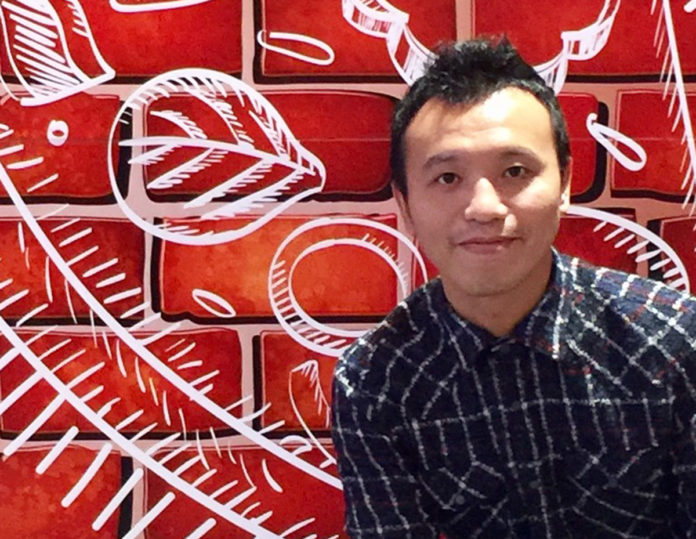Founder of local food delivery app Food4U, Dwain Lei, talks with Business Daily about the challenges he faced starting a different kind of food delivery business, and what it takes to break into the competitive local market of food-related apps.
What projects were you involved in before starting Food4U?
I never had any projects in Macau before, but I have an app development company in Taiwan that I started two years ago. Previous to that, I worked in Macau as a marketing director for The Venetian, Galaxy and City of Dreams. I don’t have knowledge in programming, but my partner – also my brother – works for Microsoft Taiwan, and he’s in charge of my app company in the country.
How did you come up with the idea for Food4U?
Seven years ago I went to Manchester in the United Kingdom and saw that a friend had received a meal, which he said was ordered through an online takeaway website. I didn’t know about that concept, and after researching it and seeing other takeaway websites, I decided to apply that concept in Macau. I thought it would be a good idea for the city, so I launched the company in August of 2016, after developing the mobile application through my company in Taiwan.
What are the services that Food4U provides?
Users have to register for free on the application, verify their identity, and then they can order food through it. We have printers in the registered restaurants that print the takeaway order when someone makes an order. Restaurants and users need to pay us MOP25 for each order.
How many users does Food4U have at the moment?
At the moment, we have 200 restaurants registered and 40,000 users, mostly on iPhone iOS (Apple operating system), which locals prefer, and with 2,000 being Android (Google operating system) users.
Was it hard to persuade restaurants to join the platform?
A bit, yes. When I went into the restaurants, it was hard to find the manager or the responsible persons, since they were never in sight. The solution was to get three sales representatives to search and contact restaurant owners to join the service. Now we have six call-centres to call restaurants and ask them to join our service.
How many orders does the app process per day and how long is the average delivery time?
The programme receives around 1,500 orders per day. Normally after the restaurant receives the order, they will contact our call-centre to assign a driver to deliver the food to the clients. The whole process normally takes around 40 minutes and at the moment we have 37 scooter drivers.
Are the drivers local residents?
Yes, all of them are locals. We don’t use ‘Blue Card’ work permit holders.
Was it easy to find workers for the company?
No, it was very hard to find drivers in Macau. We wanted to find full-time workers that had knowledge of English, so at the time all the ones we found were still studying at the University here. We only operate between 11am and 3am so we offer two shifts, one for day-time and another for night-time.
Are you looking to increase your workforce at the moment?
Yes, the company’s takeaway charge will be increased, so we will be able to hire more drivers. We get many orders per day, so my 37 drivers are not enough at the moment, and we expect to have a headcount of up to 100 drivers by 2018.
We also have a programme to hire people suffering from reduced mobility diseases such as Amyotrophic Lateral Sclerosis (ALS) to work in the office, or even to do deliveries close to the office if they are able to. We’re contacting local support institutions for this purpose.
How much was the initial investment for the company?
When I created the company I didn’t rent an office in Macau, I just created the app. After we did some posts about the service on Facebook, a lady that owned three pharmacies contacted us to make the first investment in the company, of around MOP3 million. We also got a MOP10 million investment from a Chinese Australian investor. I worked in the casino industry for many years so I had a good network of people I could contact to see if they were interested in investing in the company.
Where was the money invested mainly?
The money will be used in the future for promoting the service on buses and to give some MOP20 vouchers for members to make their first orders on Food4U. It will also be used to hire more drivers as well.
Has the company reached breakeven?
At the moment it is not balanced, it’s still 10 to 20 per cent unbalanced, but I think it will get balanced in the future shortly.
What was the largest challenge when starting Food4U?
Probably persuading restaurants to join the service, it still is. Many restaurant owners are very stingy, they don’t want to spend money to join the service and don’t understand exactly how the online takeaway concept can increase their orders.
There are a lot of similar applications to yours in Macau. What differentiates yours from the others?
It’s true there are many food delivery services in Macau. The largest difference with our company is that people can order from the restaurants’ set menus [via the app] and change the order. For example, if you want a Wonton soup, you can decide if you want to add beef or if you want to remove onions, and other personal requests that other apps don’t do.
Has the Macau government helped your company via any means?
No, but I really hope the government could help the restaurants who register with our app to pay the takeaway fees. For each MOP25 the restaurants provide, I need to use MOP10 to pay the driver’s salary.
In your opinion what more can the government do to help startups and SMEs in Macau?
They could provide more support for local app development. I’m currently developing another app service for Macau. I still consider that mobile application businesses are still a viable and sustainable business option.
Is it easy to find tech programmers in Macau?
It’s not easy, since good programmers will normally be working in the casinos where they can get a better salary. Macau is not the best place to find professional programmers, and it’s one of the reasons why I opened my app development company in Taiwan, where it is easy to find quality programmers for lower salaries. The market there is also larger.
What do you think Taiwan does better in terms of supporting startups?
The Taiwanese government will sometimes require my company to make projects for them such as government websites and apps.
What would be your advice for local entrepreneurs considering starting up a company?
Mobile app services startups need to be willing to work hard and spend a lot of time on different tasks. When I started this business I would spend around 16 hours per day for one year just focusing on the company, making calls or even deliveries to clients myself if drivers weren’t available. I needed to do it if I wanted to improve my business.
—
Learn from Taiwan
Previously one of Asia’s four economic tigers, in recent years Taiwan has had to learn how to transform from a hardware tech giant to a startup and software centre.
With a population of 23 million people, Taiwan ranks 14th for competitiveness and 17th for innovation in the most recent World Economic Forum global competitiveness report.
This transformation involved several measures to better exploit the abundance of web programmers and engineers.
Recent policies of the Taiwanese government to boost local entrepreneurship and innovation have included creating the first outpost by an Asian country in Silicon Valley in 2015, and funding local startups to move and develop their startups in the area.
The Taiwanese government has also recently diverted US$310 million to develop a new technological park in order to become Asia’s own Silicon Valley.
Funds gathered by Taiwanese government-backed investment funds also reached a total of US$400 million in 2016, with a government department named “Head Start Taiwan” Project being created solely to develop the country’s startup ecosystem.
Other initiatives involved the implementation of an entrepreneur visa, which allows foreign nationals, including Hong Kong and Macau residents, to obtain an initial one-year resident permit, if they intend to invest in local startups or develop their own companies in the country.
























